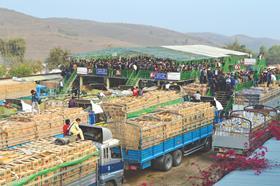
It has been over 100 days since the first case of Coronavirus (Covid-19) was recorded in the Chinese port city of Wuhan. Declared a pandemic by the World Health Organisation (WHO), it has had a far and wide-reaching impact on all facets of life.
China seems to have navigated the worst of the virus and reports suggest the situation is improving. But it hasn’t been without difficulty.
Reefer Trends’ Richard Bright explains the scenario for the global shipping industry in the forthcoming April issue of Asiafruit, looking in particular at what the ports across China faced as the outbreak occurred, and what lies ahead in the coming months.The backlog of reefer containers and other supply chain disruptions, exacerbated by a workforce dealing with quarantine restrictions, is an issue a number of other major markets are now grappling with.
Worldwide shut down
China’s lockdown had a flow-on effect on exports from a number of countries. Chilean blueberry and cherry shipments were heavily affected, but as Fruitnet’s Maura Maxwell writes, the impact has been felt across the whole of Latin America.
Malaysia followed suit with a country-wide lockdown in mid-March, albeit with exemptions for fresh produce trade. These exemptions were particularly important for Singapore, which, according to the Singapore Food Agency, imports over 90 per cent of the food consumed by its 5.6m residents. Malaysia is a key supplier of fruit to Singapore, accounting for 39 per cent of all imports.
India’s Prime Minister, Narendra Modi, ordered a total lockdown for the country’s 1.3bn people on 24 March, banning everyone from leaving their homes for three weeks. Exemptions were made for essential services, including workers involved in the fresh produce supply chain.
Relevant workers require written permission from local authorities before they’re allowed to leave their homes. But according to Nina Patil, co-director of Indian grape grower-shipper Fresh Express, news coverage of the pandemic is causing concern, and people might not leave even when allowed.
“Rumours and bombarding by the media have added to people's fears and, of course, they are scared to step out, so even when we are allowed to resume, it will be difficult,” said Patil.
This sentiment is echoed by Parth Karvat of Mumbai-based importer and grower Yupaa. “The big question is will farmers, transporters, port operators and thousands of wholesalers and retailers step out of their houses to carry on the trade in times of fear of them getting infected?”
Finding new avenues
Tropical fruit exports from South-East Asia were significantly impacted by China’s closure, with reports suggesting growers and exporters in Myanmar, Vietnam and Thailand were faced with the choice of flooding domestic markets or seeing their produce rot at closed border crossings. In Myanmar, some growers chose to leave fruit unpicked altogether, as there was no certainty of recouping the costs of harvest and transportation.
Port congestion prompted exporters to look for alternative modes of transport, namely airfreight. But flights have become increasingly scarce, with reports suggesting belly capacity in passenger aircraft is down by 90 per cent on some transatlantic routes.
Trade between Vietnam and China was buoyed by a new train service, which provided exporters of dragon fruit with a route between the two countries, albeit at much lower capacity to shipping. However, Vietnamese businesses are expecting an increase in exports to China once the market recovers post-Covid-19. China is Vietnam’s largest export market for agricultural produce. The outbreak of coronavirus saw Vietnamese agricultural exports to China drop by 29.4 per cent over the first quarter of 2020, compared to the same time last year.
Pakistan is another country that has been forced to close its borders and suspend airline services. This action led Pakistan’s fruit and vegetable association (PVFA) to suggest the overall impact could cost the industry up to US$150m. PVFA head, Waheed Ahmed, indicated things could get worse before they get better. “If the present situation prevails for the next two months, it is anticipated that the overall export of fruits and vegetables from Pakistan will sustain a massive loss of over US$150m,” he said.
“Transportation of food items via sea route is experiencing problems and under these circumstances, only those countries that have a strong agriculture sector along with adequate food for their local population can avoid such a crisis.”
Managing restrictions
Governments across the world have imposed strict regulations in an effort to curb the spread of the virus, including social distancing measures to maintain a distance of 1.5-metres between each person.
While many businesses have had to temporarily close, essential services, including fresh produce supply, remain operational. While the 1.5-metre separation rule in packhouses has proved challenging, companies have gone to great lengths to assure supply will not be interrupted. Fresh Del Monte Produce president, Youssef Zakharia, said the company had taken numerous steps to support its employees and ensure business continuity.
These include the activation of its global executive crisis management and regional response teams. The company has also increased its social distancing measures by reducing the number of required employees where feasible, including on farms, in packhouses, production facilities and port terminals.
Another flow-on effect caused by the widespread border closures is an impending labour shortage. With flights grounded, countries that rely on foreign workers during harvest will be under greater pressure than ever to get fruit picked, packed and exported.
Experts in New Zealand were forecasting a labour shortage prior to the coronavirus outbreak, with border closures likely to intensify the problem. However, it was recently reported New Zealanders left without job security or ongoing employment have turned to horticulture in their search for work. New Zealand Kiwifruit Growers reported some businesses now have a workforce of up to 90 per cent New Zealanders.
In Australia, peak industry bodies Ausveg, the Australian Fresh Produce Alliance (AFPA), Citrus Australia and the Australian Banana Growers Council (ABGC) joined in chorus, calling on the Australian government to extend the visas of foreign workers already in the country. Their calls were answered in early April, with the announcement of temporary changes to visa arrangements.
Meanwhile in Italy, an epicentre for the spread of the virus, producers are concerned about the future harvesting of fruit including peaches, nectarines, plums, cherries and strawberries, as well as a number of different vegetable crops. Much of Italy’s foreign workforce is sourced from Eastern European countries including Poland, Romania and Hungary. The situation in Italy is such that growers fear the rapid spread of the virus is likely to deter foreign workers for many months to come.

Consumers have turned to shopping for groceries online
Consumption habits change
With people across many countries forced to self-isolate or stay at home, food consumption habits have undergone a dramatic shift. Food service channels have been badly impacted with the closure of restaurants and bars, and restrictions on eating out. Consumers have also turned to shopping for groceries online as an alternative to visiting physical stores. Online shopping has seen a surge in purchasing, with grocery sales one of the leading markets.
Even in South Korea, where new cases of coronavirus have been on the decline, the USDA reports people remain reluctant to leave their homes and are mainly sticking to buying groceries online. While some people continue to visit brick-and-mortar stores, even their consumption trends have changed, with sales up but visits down, indicating that consumers are visiting to stock up on items – something governments across the world are urging consumers to stop doing.
The fresh produce industry was already heading towards a future where online sales, and subsequently online marketing, were to play a much bigger role in promotional activity. It’s uncertain whether the change in consumption habits as a result of coronavirus will remain the norm moving forward. But what it is clear is that companies will be moving quickly to implement new measures in an effort to secure future sales.
This round-up features in the April edition of Asiafruit Magazine. To order your copy, email subscriptions@fruitnet.com



